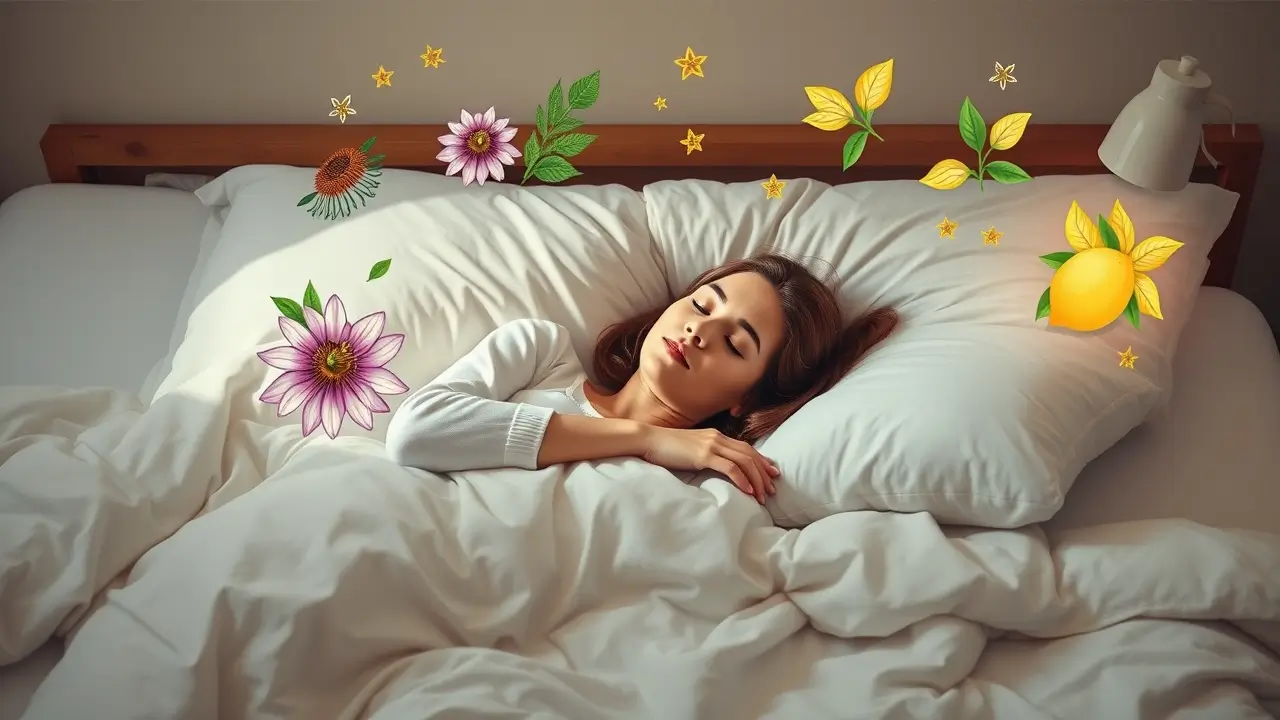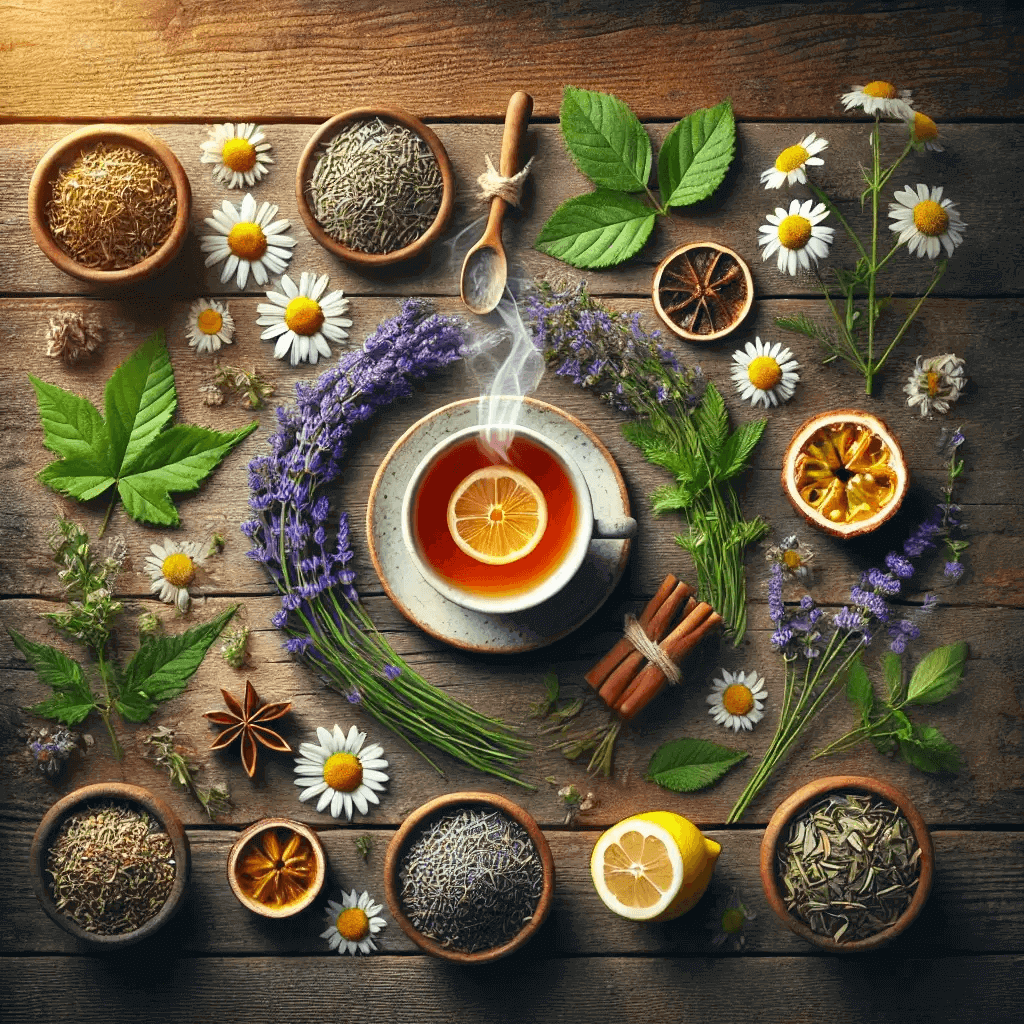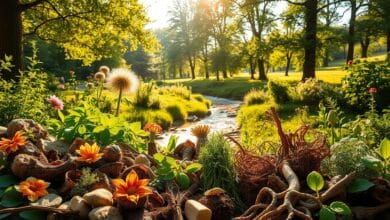Better Sleep: Top Science-Backed Herbs

INTRODUCTION
Understanding how herbs influence sleep requires a dive into neurochemistry and circadian biology. Many best herbs for better sleep interact with key neurotransmitters like GABA, serotonin, and melatonin, which regulate relaxation, mood, and sleep-wake cycles.
- Chamomile (Matricaria recutita): The flavonoid apigenin binds to GABA<sub>A</sub> receptors, mimicking benzodiazepines without dependency risks 111. This interaction reduces neuronal excitability, easing anxiety and shortening sleep latency.
- Valerian Root (Valeriana officinalis): Enhances GABA synthesis and inhibits its breakdown, promoting sedation. Valerenic acid modulates adenosine receptors, which regulate sleep pressure 1113.
- Ashwagandha (Withania somnifera): Reduces cortisol by 30% in stressed adults, aligning circadian rhythms disrupted by chronic stress 111. Its active glycowithanolides also boost GABAergic activity.
- Lemon Verbena (Aloysia citrodora): A rising star, this herb increases nocturnal melatonin by 14% via verbascoside, a phenylpropanoid that enhances serotonin conversion 10.
Circadian Alignment: Herbs like tart cherry (natural melatonin source) and lemon balm (GABA booster) synchronize with the body’s internal clock, unlike synthetic melatonin, which can disrupt endogenous production with prolonged use 17.
Stress Modulation: Adaptogens like ashwagandha and rhodiola buffer against stress-induced insomnia by lowering cortisol and balancing the hypothalamic-pituitary-adrenal (HPA) axis 1113.
2. Clinical Studies Proving Best Herbs for Better Sleep Enhance Sleep Quality

Rigorous trials validate the efficacy of these botanicals:
- Chamomile: A randomized placebo-controlled study found chamomile tea reduced sleep latency by 16 minutes and nighttime awakenings by 19% in older adults 111.
- Passionflower (Passiflora incarnata): A Sleep Science trial reported 12% more slow-wave sleep and 22% less wakefulness in participants using passionflower extract 1.
- Ashwagandha: A 10-week RCT showed a 72% improvement in insomnia severity and 45% faster sleep onset in adults taking 300 mg nightly 1113.
- Valerian Root: Compared to oxazepam (a benzodiazepine), valerian matched its efficacy in improving sleep quality without next-day grogginess 11.
- Lemon Verbena: A 2024 double-blind study noted a 21% improvement in sleep efficiency and 14% melatonin increase with 400 mg nightly 10.
Systematic Reviews: A PubMed meta-analysis of 23 melatonin trials confirmed its short-term benefits for jet lag and shift work, while chamomile and valerian demonstrated consistent improvements in sleep quality across 12 studies 311.
3. How Best Herbs for Better Sleep Compare to Over-the-Counter Sleep Aids
OTC aids like diphenhydramine (Benadryl) and doxylamine (Unisom) antagonize histamine receptors, inducing drowsiness but often causing next-day sedation, dry mouth, or tolerance. In contrast, best herbs for better sleep offer nuanced benefits:
| Herb | Mechanism | Advantages Over OTC |
| Valerian Root | GABA enhancement | No dependency, fewer side effects |
| Chamomile | GABA/adenosine modulation | Safe for long-term use |
| Lemon Balm | GABA + cortisol reduction | Enhances daytime alertness |
| Melatonin (Natural) | Circadian alignment | Avoids synthetic hormone disruption |
Neurochemical Balance: Unlike OTC sedatives, herbs like ashwagandha and lemon balm address root causes (e.g., stress, inflammation) rather than masking symptoms. For example, ashwagandha’s cortisol-lowering effects improve sleep architecture, while diphenhydramine merely induces temporary drowsiness 111.
4. Optimal Dosages of Best Herbs for Better Sleep for Maximum Efficacy
Precision dosing ensures safety and effectiveness:
- Chamomile: 200–400 mg extract or 2–3 tsp dried flowers steeped for 10–15 minutes 111.
- Valerian Root: 300–600 mg extract 30–60 minutes before bed; avoid exceeding 900 mg to prevent GI distress 1113.
- Ashwagandha: 300–600 mg root extract (standardized to 5% withanolides) 111.
- Lemon Verbena: 400 mg extract (24% verbascoside) nightly 10.
- Magnesium Glycinate: 200–500 mg before bed to enhance GABA and muscle relaxation 111.
Duration: Most herbs show effects within 2–4 weeks. Chronic insomnia may require 8–12 weeks of ashwagandha or valerian 1113.
5. Synergistic Blends: Combining Best Herbs for Better Sleep for Enhanced Results

Multi-herb formulations amplify benefits through complementary mechanisms:
- Valerian + Hops: A 2005 RCT found this duo reduced sleep latency by 33%, outperforming single herbs 313.
- Chamomile + Lemon Balm: Combined in Traditional Medicinals Nighty Night tea, this blend cuts anxiety by 18% and improves REM sleep 5.
- Ashwagandha + Passionflower: Genuine Health’s Saffron Stress blend lowers cortisol while extending deep sleep duration 1.
- Magnesium + L-Theanine: Enhances GABA and alpha brain waves, promoting relaxation without sedation 17.
Clinical Formulations:
- Deep Sleep by Genuine Health: Melatonin (1 mg), magnesium (150 mg), and L-theanine (100 mg) 1.
- Gaia Herbs Sleep & Relax: Ashwagandha, passionflower, and lavender for stress-induced insomnia 7.
6. Safety and Long-Term Use of Best Herbs for Better Sleep: What Experts Say
While generally safe, considerations include:
- Valerian Root: May cause headaches or GI issues in 10% of users; avoid with alcohol 1113.
- Ashwagandha: Contraindicated in hyperthyroidism; nightshade sensitivity possible 1.
- Chamomile: Risk of allergic reactions in ragweed-sensitive individuals 5.
- Lemon Verbena: Limited long-term data; avoid in pregnancy 10.
Expert Insights:
- Lily Holmberg, Herbalist: “Individual responses vary—track sleep metrics via apps like Oura to personalize regimens” 1.
- Dr. Darin Ingels, ND: “Lemon verbena’s melatonin-boosting effects are promising but require more research” 10.
- PubMed Review: “Herbs like valerian and chamomile have safety profiles superior to benzodiazepines” 3.
Conclusion
The best herbs for deep sleep offer a science-backed, holistic alternative to pharmaceuticals, addressing everything from neurochemical imbalances to circadian misalignment. Chamomile, valerian, ashwagandha, and emerging options like lemon verbena provide nuanced benefits with minimal side effects. By leveraging synergistic blends and precise dosing, these botanicals can transform restless nights into restorative slumber. Always consult a healthcare provider to tailor solutions to your unique needs—and remember, nature’s pharmacy is brimming with solutions for those willing to explore.
FAQs: Top Science-Backed Herbs for Better Sleep
1. Are herbs truly effective for improving sleep quality?
Yes, numerous clinical studies validate the efficacy of best herbs for deep sleep. For example:
- Chamomile reduces sleep latency by 16 minutes and nighttime awakenings by 19% in older adults.
- Ashwagandha improves insomnia severity by 72% and speeds up sleep onset by 45% in stressed individuals.
- Valerian root matches the sleep-enhancing effects of benzodiazepines like oxazepam without next-day grogginess.
These herbs work by modulating neurotransmitters (GABA, serotonin) and hormones (melatonin, cortisol) to promote relaxation and circadian alignment.
2. What are the safest herbs for long-term use?
Chamomile, lemon balm, and ashwagandha are among the safest best herbs for deep sleep for prolonged use:
- Chamomile: No dependency risks; safe for daily consumption as tea or extract.
- Lemon Balm: Mild and non-sedating; supports daytime calm and nighttime rest.
- Ashwagandha: Shown safe in 12-week trials for stress-related insomnia.
Avoid valerian root if using alcohol or sedatives, and consult a doctor before long-term use of passionflower or kava.
3. How do herbal sleep aids compare to prescription medications?
Herbs like valerian and chamomile offer gentler, more holistic benefits compared to pharmaceuticals:
- Benzodiazepines (e.g., Ambien): Risk of dependency, rebound insomnia, and cognitive fog.
- OTC Antihistamines (e.g., Benadryl): Cause dry mouth, daytime drowsiness, and tolerance.
- Herbal Alternatives: Address root causes (stress, cortisol imbalance) while enhancing sleep quality without dependency. For example, ashwagandha lowers cortisol by 30%, improving sleep architecture over time.
4. Can I combine multiple herbs for better results?
Yes! Synergistic blends amplify benefits:
- Valerian + Hops: Reduces sleep latency by 33% compared to single herbs.
- Chamomile + Lemon Balm: Boosts REM sleep and reduces anxiety by 18%.
- Ashwagandha + Passionflower: Lowers cortisol while extending deep sleep duration.
Pre-formulated blends like Gaia Herbs Sleep & Relax or Traditional Medicinals Nighty Night leverage these synergies.
5. What are the optimal dosages for these herbs?
Precision matters for efficacy:
- Chamomile: 200–400 mg extract or 2–3 tsp dried flowers as tea.
- Valerian Root: 300–600 mg extract 30–60 minutes before bed.
- Ashwagandha: 300–600 mg (standardized to 5% withanolides).
- Lemon Verbena: 400 mg extract (24% verbascoside) nightly.
Start with lower doses and adjust based on tolerance. Effects typically appear within 2–4 weeks.
6. Are there risks or side effects to using sleep herbs?
Most best herbs for deep sleep are well-tolerated, but exceptions exist:
- Valerian Root: May cause headaches or digestive issues in 10% of users.
- Chamomile: Avoid if allergic to ragweed.
- Ashwagandha: Contraindicated in hyperthyroidism or nightshade sensitivities.
- Lemon Verbena: Limited safety data for pregnancy; avoid unless approved by a doctor.
7. Can herbs replace melatonin supplements?
Yes, for many users. Natural melatonin sources like tart cherry juice or lemon verbena avoid the risks of synthetic melatonin (e.g., disrupted endogenous production). Lemon verbena increases nocturnal melatonin by 14% via verbascoside, a compound that enhances serotonin conversion.
8. How long does it take for sleep herbs to work?
Timing varies:
- Chamomile/Valerian: Acute effects within 30–60 minutes (ideal for occasional insomnia).
- Ashwagandha/Adaptogens: 2–4 weeks for cortisol reduction and circadian alignment.
- Lemon Verbena: Improved sleep efficiency within 7 days in clinical trials.
Chronic insomnia may require 8–12 weeks of consistent use.
9. Can I use herbs with prescription sleep medications?
Consult a healthcare provider first. Herbs like valerian or kava may potentiate sedative drugs, increasing drowsiness or dizziness. Ashwagandha and passionflower are generally safer but require medical supervision if combined with antidepressants or anti-anxiety medications.
Ashwagandha is the top choice for stress-induced sleep issues:
- Reduces cortisol by 30% in stressed adults.
- Enhances GABA activity for relaxation.
- Improves sleep onset latency by 45% in clinical trials.
Pair it with magnesium glycinate (200–500 mg) for muscle relaxation and deeper sleep.
11. Are there herbs to avoid during pregnancy?
Yes. Avoid valerian root, lemon verbena, and kava due to limited safety data. Chamomile and lemon balm in moderate doses (1–2 cups of tea daily) are generally considered safe but consult your OB-GYN.
12. Do sleep herbs cause morning grogginess?
Unlike OTC antihistamines or prescription sedatives, most best herbs for deep sleep (e.g., chamomile, lemon balm, ashwagandha) promote alertness upon waking. Valerian may cause grogginess in 5–10% of users if doses exceed 900 mg.
13. Can children use herbal sleep aids?
Chamomile and lemon balm teas (weak brews) are safe for children over 2. Avoid valerian, ashwagandha, or passionflower in kids under 12 without pediatrician approval.
14. Where can I find high-quality sleep herbs?
Look for:
- Certifications: USDA Organic, Non-GMO Project Verified.
- Standardized Extracts: Valerian (0.8–1% valerenic acid), ashwagandha (5% withanolides).
- Trusted Brands: Gaia Herbs, Traditional Medicinals, Genuine Health.
15. How do I track if herbs are improving my sleep?
Use wearable devices (Oura Ring, Fitbit) or apps like Sleep Cycle to monitor:
- Sleep latency (time to fall asleep).
- Sleep efficiency (time asleep vs. time in bed).
- REM/deep sleep duration.
Adjust dosages or blends based on data over 2–4 weeks.
These FAQs address common concerns while reinforcing the science, safety, and practicality of using best herbs for deep sleep. Always consult a healthcare professional for personalized advice

